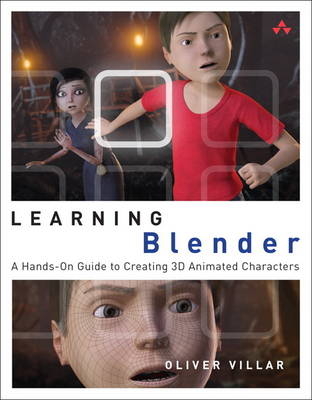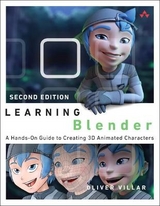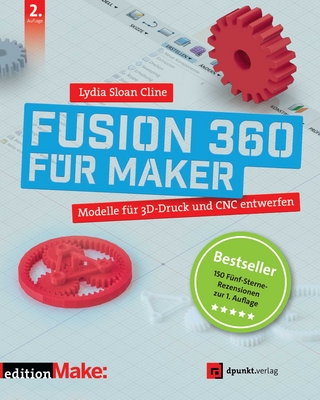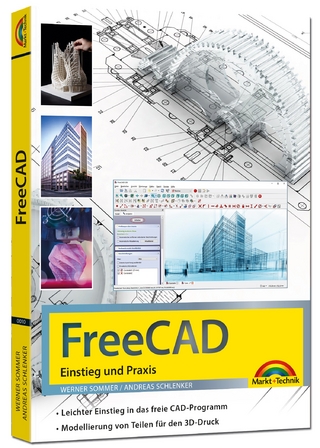
Learning Blender
Addison-Wesley Educational Publishers Inc (Verlag)
978-0-13-388617-7 (ISBN)
- Titel erscheint in neuer Auflage
- Artikel merken
Learning Blender walks you through every step of creating an outstanding animated character with the free, open source, 3D software Blender, and then compositing it in a real video using a professional workflow. This is the only Blender tutorial to take you from preproduction to final result, and it’s perfect for both 3D novices and those who’ve used other 3D Software.
Focusing on Blender 2.71 and above, 3D-professional Oliver Villar explains all the basics, including Blender’s interface, controls, and how to manipulate objects. Once you’ve mastered the fundamentals, you’ll follow a realistic 3D workflow through a complete project.
You’ll find chapters on every aspect of the character creation: design, modeling, unwrapping, texturing, shading, rigging, and animation. Once your character is ready and animated, you’ll learn how to integrate it into a real video using camera tracking techniques, lighting, and compositing. Each skillset is taught hands on, and available online video tutorials (more than 5 hours) will guide you through Blender’s trickier tasks.
By the time you’re done, you’ll understand how the whole process fits together, and how to use Blender to create outstanding characters for all media. You’ll also build strong Blender skills you can apply in any 3D project, whether it involves characters or not.
Learn How To
Master Blender’s innovative user interface, navigation, and selection techniques
Create your first scene with Blender and get comfortable with its core tools
Prepare for projects so they’ll go as smoothly as possible
Use modeling tools to create a 3D character
Bring your character to life with color, textures, and materials
Create your character’s skeleton and make it walk
Make the most of Blender’s Camera Tracking tools
Add lights to your 3D scene
Render with Blender Internal or the powerful new Cycles render engine
Composite your 3D character into a real video
Switch to Blender from 3ds Max, Maya, or XSI
Register your book at informit.com/register to access all of this book’s production files, plus bonus video tutorials, and a useful Blender keyboard shortcut reference.
Oliver Villar has been drawing since he was a kid. His interest in art led him to 3D, which he’s been studying since 2004. He used commercial 3D software before discovering Blender in 2008. Since then, he has used Blender professionally as a 3D designer and tutor. In 2010 he founded blendtuts.com, a Blender tutorials site. He is currently co-directing Luke’s Escape, a short, 3D-animated film made with Blender.
Preface xxiii
Acknowledgments xxix
About the Author xxxi
Learning Blender Ancillaries xxxiii
Part I: The Basics of Blender 1
Chapter 1: What You Need to Know about Blender 3
What Is Blender? 3
Commercial Software versus Open-Source Software 4
The History of Blender 5
The Blender Foundation and the Blender Institute 7
The Blender Community 9
Summary 9
Exercises 10
Chapter 2: Blender Basics: The User Interface 11
Downloading and Installing Blender 11
Blender User Interface 12
Understanding the 3D View 13
Navigating the 3D View 17
Managing Areas 19
Editor Types 20
Selecting Objects 23
Using the 3D Cursor 24
Blender User Preferences 26
Summary 28
Exercises 28
Chapter 3: Your First Scene in Blender 29
Creating Objects 29
Moving, Rotating, and Scaling 30
Naming Objects and Datablocks 33
Interaction Modes 36
Applying Flat or Smooth Surfaces 37
Modifiers 38
Blender Render and Cycles 41
Materials 42
Turning on the Lights 44
Moving the Camera in Your Scene 45
Rendering 46
Summary 48
Exercises 48
Part II: Beginning a Project 49
Chapters 4: Project Overview 51
The Three Stages of a Project 51
Defining the Stages 53
A Character-Creation Plan 55
Summary 56
Exercises 56
Chapter 5: Character Design 57
Character Description 57
Designing the Character 60
Adding Color 66
Final Design 67
Character Reference Images 68
Other Design Methods 69
Summary 70
Exercises 70
Part III: Modeling in Blender 71
Chapter 6: Blender Modeling Tools 73
Working with Vertices, Edges, and Faces 73
Selecting Vertices, Edges, and Faces 74
Accessing Modeling Tools 74
Selections 75
Mesh Modeling Tools 78
LoopTools 94
Tips and Tricks 95
Summary 96
Exercises 96
Chapter 7: Character Modeling 97
What Is Mesh Topology? 97
Modeling Methods 99
Setting Up the Reference Planes 101
Modeling the Eyes 103
Modeling the Face 107
Modeling the Torso and Arms 116
Modeling the Legs 125
Modeling the Boots 127
Modeling the Hands 129
Modeling the Cap 133
Modeling the Hair 136
Modeling the Final Details 140
Summary 144
Exercises 144
Part IV: Unwrapping, Painting, and Shading 145
Chapter 8: Unwrapping and UVs in Blender 147
How Unwrapping and UVs Work 147
Unwrapping in Blender 148
Things to Consider before Unwrapping 155
Working with UVs in Blender 156
Unwrapping the Rest of the Character 162
Packing UVs 163
Summary 165
Exercises 166
Chapter 9: Painting Textures 167
Main Workflow 167
Painting in Blender 167
Creating the Base Texture 170
Texturing in 2D Image Editing Software 172
Seeing the Painted Character in Blender 176
Summary 177
Exercises 178
Chapter 10: Materials and Shaders 179
Understanding Materials 179
Shading Your Character with Blender Render 183
Shading Your Character with Cycles 197
Summary 205
Exercises 205
Part V: Bringing Your Character to Life 207
Chapter 11: Character Rigging 209
Understanding the Rigging Process 209
Working with Armatures 210
Rigging Your Character 215
Rig Organization 225
Skinning 228
Creating the Facial Rig 235
Creating Custom Shapes 241
Applying Final Touches to the Rig 242
Summary 243
Exercises 244
Chapter 12: Animating Your Character 245
Inserting Keyframes 245
Animation Editors 246
Animating a Walk Cycle 251
Summary 257
Exercises 257
Part VI: Getting the Final Result 259
Chapter 13: Camera Tracking in Blender 261
Understanding Camera Tracking 261
Things to Consider before Filming 262
The Movie Clip Editor 263
Tracking the Camera 264
Testing Camera Tracking 270
Summary 271
Exercises 271
Chapter 14: Lighting, Compositing, and Rendering 273
Lighting Your Scene 273
The Node Editor 275
Compositing Your Scene in Blender Render 281
Compositing Your Scene in Cycles 287
Rendering 290
Summary 292
Exercises 292
Chapter 15: Other Blender Features 293
Particles 293
Hair Simulation 293
Cloth Simulation 294
Rigid and Soft Bodies 294
Fluids Simulation 294
Fire and Smoke 295
Game Engine 295
Masking, Object Tracking, and Video Stabilization 295
Sculpting 295
Retopology 296
Maps Baking 296
Python Scripting 297
Summary 297
Index 299
| Erscheint lt. Verlag | 16.10.2014 |
|---|---|
| Verlagsort | New Jersey |
| Sprache | englisch |
| Maße | 180 x 230 mm |
| Gewicht | 676 g |
| Themenwelt | Informatik ► Grafik / Design ► Digitale Bildverarbeitung |
| Informatik ► Grafik / Design ► Film- / Video-Bearbeitung | |
| ISBN-10 | 0-13-388617-4 / 0133886174 |
| ISBN-13 | 978-0-13-388617-7 / 9780133886177 |
| Zustand | Neuware |
| Informationen gemäß Produktsicherheitsverordnung (GPSR) | |
| Haben Sie eine Frage zum Produkt? |
aus dem Bereich



